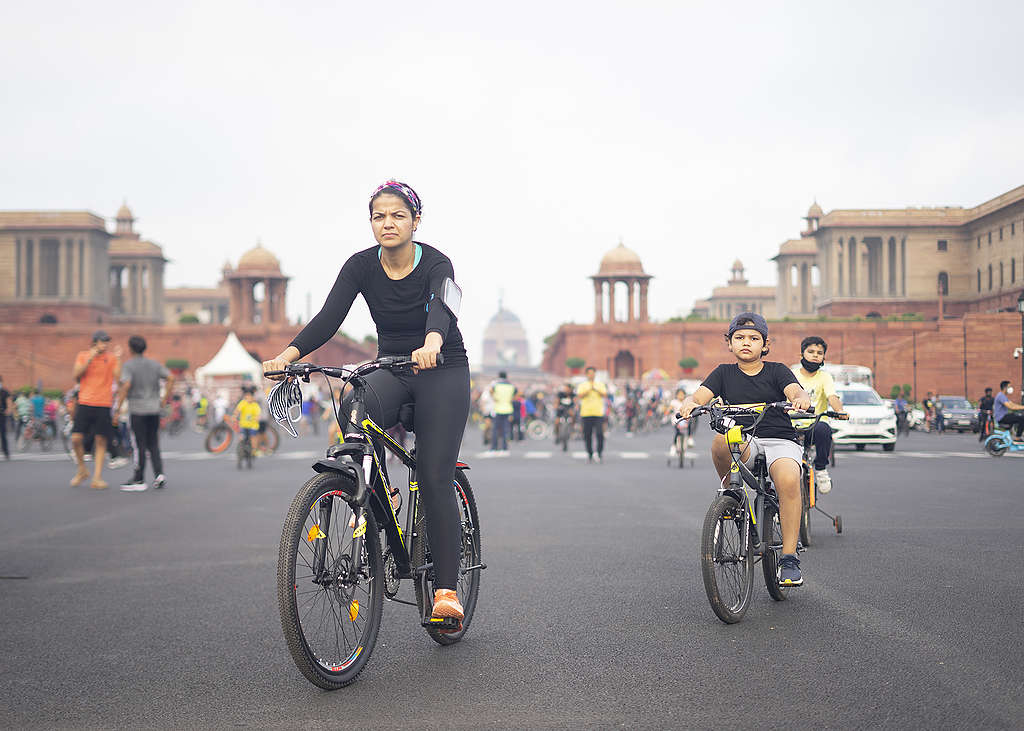New Delhi| December 13, 2018 | New coal power plants in regions such as Uttar Pradesh, in close proximity to heavily polluted Delhi-NCR are financially risky, unnecessary and pose a health risk to millions, even as cheaper electricity is available from renewable energy, a Greenpeace India analysis stated today. The analysis focuses on the 1,320 MW Khurja super thermal power project (STP) in Bulandshahr, Uttar Pradesh, proposed by THDC India Limited, a joint venture by Government of India & Government of Uttar Pradesh.
The analysis [1] shows that with the dramatic reduction in the cost of renewable energy — solar, wind or solar-wind hybrid projects will not only offer cheaper, cleaner electricity to the region, but also be more financially secure for the project promoters and investors, as opposed to building a new coal-fired plant.
“It is disturbing that the Finance Ministry has given an in-principle agreement to finance the Khurja coal project, despite the dangerous air quality in the region, and the changing economics of renewable energy. New coal plants make no economic or ecological sense,” said Pujarini Sen, Senior Greenpeace Campaigner. “Even as the Finance Ministry is greenlighting scarce resources into the struggling coal sector, solar power developers are being unfairly burdened by safeguard duties; and the KUSUM solar pump scheme for farmers is being given step-motherly treatment.”
Using the land footprint of the Khurja super thermal power plant as an example, the analysis looks at what a solar plant of the size and scale of the Khurja STP would entail vis a vis parameters such as investment required, job growth, return on equity, electricity generation and avoided pollution.
The 1,200 acres allotted to the power plant alone have a solar potential of 240 MW. In addition, the Khurja coal power project would also require 3,378 acres of mostly forest land [2] (involving the felling of 9 lakh trees) in Singrauli to be mined for coal. A solar project with an equivalent land footprint (3378 acres for the mine) in a non-forest area would be able to host an additional 675 MW, taking the total capacity from a Khurja-sized project to 915 MW.
A solar plant of this size would create an estimated 8,341 jobs. The cost of such a plant is estimated to be around Rs.3,204.6 Cr (at 3.5 Cr per MW), a stark difference in price, as compared to the Rs.12,676 crore that will be invested in the thermal power plant.
It would also offset a significant 1.2 million tonnes of CO2 annually.
Ravi Sekhar from The Climate Agenda, an organization working for Clean Air and Energy for people of Uttar Pradesh stressed that, “people of Uttar Pradesh need affordable electricity and clean air – the Khurja coal power plant will deliver neither. We are calling on the Ministry of Finance and THDC to re-examine this project in light of the actual needs of the region.”
Emissions from coal-based power plants are a major source of air pollution, leading to more than one lakh deaths annually in India [3]. A recent study pointed out that India has three of the world’s largest NOx hotspots, two (Delhi-NCR and Singrauli-Sonbhadra in Madhya Pradesh-Uttar Pradesh) of these three hotspots are in close proximity to the proposed mine and plant, with the third located around the coal burning cluster of Talcher and Angul in Odisha. Khurja lies in the Bulandshahr district of Uttar Pradesh, one of the most polluted regions in India. Studies suggest Uttar Pradesh accounted for 2.6 lakh deaths in 2017 out of 12.4 lakh deaths across India due to air pollution along with huge decrease in life expectancy for populations living in Bulandshahr.
Notes to Editor:
[1] https://act.gp/KhurjaSolarAnalysis
[2] http://forestsclearance.nic.in/writereaddata/FAC_Minutes/10119125212141Minutes20thSep2018.PDF
For further information contact:
Pujarini Sen, Senior Campaigner, Climate and Energy, Greenpeace India; [email protected]; +91 8586016050
Anindita Datta Choudhury, Senior Communication Specialist; [email protected], +91 9871515804; +91 9315608925

Donate today or consider remembering Greenpeace in your Will.

Discussion
Thank You For Sharing This Information On Supporting Solar Power Panels .